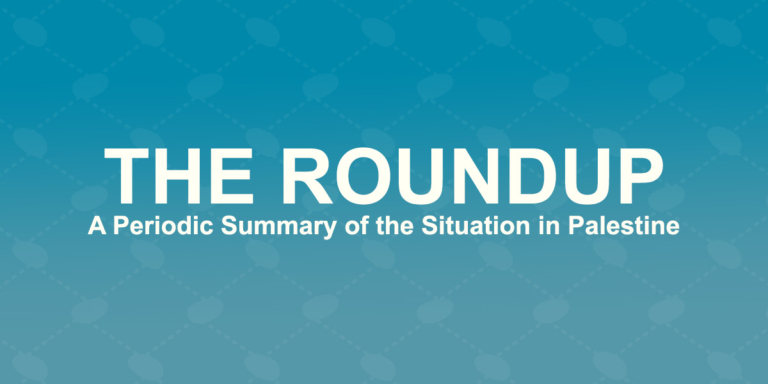
The Roundup is a periodic summary curated by the Palestine/Israel Program at Arab Center Washington DC, bringing together recent and important fact-based reports on the situation in Palestine with the goal of sharing this crucial information with our readers.
Facts on the Ground
More than Just Numbers: Palestinian Children under Israeli Occupation
- A report by humanitarian organization Save the Children documented the experiences of detained children aged 12-17 in Israeli military courts and shared alarming statistics on the treatment of children. Out of the children consulted, 86% reported being beaten, 60% were hit with guns or sticks, and 60% were held in solitary confinement for varying lengths of time, ranging from one day to as long as 48 days.
- Defense for Children International–Palestine reported that since the beginning of 2023, 38 children have been killed because of Israeli military and settler presence in the Occupied Palestinian Territories. Five of the child fatalities are between the ages 0-12—including a two-year-old child—while the rest fall within the 13-17 age group.
- Grave violations against children in the Gaza Strip have been reported as well by Al Mezan Center for Human Rights, which has documented an increase in child casualties in conflict-related incidents, especially during Israel’s military offensive in August 2022. The report, which was released in 2023, shows that displacement, denial of humanitarian access, and the killing or maiming of children (a total of 190 in 2022), are the most prevalent violations children experience in the Gaza Strip.
House/Structure Demolitions
- From the beginning of 2023 until May, the Israeli government ordered the demolition of 449 houses or other structures in the Occupied Territories and completely demolished the Bedouin village of al-Araqib for the 217th time. According to reports by the Israeli Committee Against Home Demolitions, the number of demolitions almost quadrupled from June to July 2023, growing from 60 to 203 and resulting in the displacement of 383 people in just those two months alone.
Israeli Settlements
- The Israeli government approved a record number of housing units in the occupied West Bank in only the first six months of 2023, according to a report from Peace Now. The all-time high of 12,855 approved housing units exceeded the 12,159 construction plans promoted in the entirety of 2020, which at the time was the highest year in settlement promotion since 2012, when Peace Now started recording settlement expansion in the Occupied Territories.
Human Rights Violations
Israel’s Deadly Attacks in the West Bank
- In an interactive report, human rights organization Al-Haq documented two of the bloodiest military raids by Israeli security forces in the West Bank in 2023. From January of this year until May 7, Israeli forces have killed 106 Palestinians, including 19 children, in the West Bank alone. Thirty-six of these killings occurred in Jenin Governorate on January 26, in a raid around 500 meters from the location where in 2022 Palestinian American journalist Shireen Abu Akleh was killed by Israeli forces and ten other Palestinians were shot. A month later, another raid in Nablus is reported to have resulted in 29 killings, the destruction of residential neighborhoods, and the targeting of civilian buildings.
- In an increasingly more aggressive pattern of raids and attacks in the West Bank, Jenin saw its deadliest year since the end of the Second Intifada in 2005. The United Nations Office for the Coordination of Humanitarian Affairs documented Israel’s large-scale air and ground operation in Jenin Refugee Camp on July 3 and 4,
Restriction of Medical Access to Palestinians During Critical Times
- The World Health Organization published official numbers of permit denials for requests to travel for healthcare appointments in May 2023, including during the period of Israeli bombardment in Gaza May 9 to 13. The Beit Hanoun (Erez) checkpoint, which is a critical point of passage to leave Gaza and receive medical help outside the territory was completely shut down during the attacks, rendering 167 patients who applied for permits to obtain proper medical help unable to do so. The report also documented a total of 124 health attacks across the occupied Palestinian territories in the first five months of this year, including 39 health worker injuries, the arrest and/or detention of nine health workers, and the killing of the director of Al-Wafa Rehabilitation Hospital in Gaza.
- Doctors Without Borders reported that the latest military attack on Jenin in July blocked access to medical assistance due to the bulldozing of roads and the intentional destruction of health structures in the camp. Despite injured Palestinians’ immediate need for medical help, all roads leading to the refugee camp were blocked “making it nearly impossible for ambulances to reach patients.”
- UN humanitarian coordinator Lynn Hastings said in a statement marking World Humanitarian Day that at least 70 healthcare workers were injured and 30 ambulances were damaged in the Occupied Palestinian Territories in the first seven months of 2023.
War Crimes Threshold Crossed Again
- Amnesty International and the Office of the United Nations High Commissioner for Human Rights investigated Israeli military operations in Gaza and Jenin this year and reported that they could amount to war crimes. The UN Special Rapporteur on the situation of human rights in the Palestinian territories occupied since 1967, along with other UN experts, denounced the operation that took place in Jenin July 3 and 4, as they found no explanation for the tactics of collective punishment that Israel deployed, which amount to egregious violations of international law and may constitute in war crimes. Similarly, Amnesty urged the International Criminal Court to investigate Israel for war crimes committed during the five-day Israeli offensive in Gaza this May, arguing that Israel’s killing of children, medical staff, and people with disabilities using high-precision strikes, along with the deliberate targeting of Palestinian residential buildings that resulted in mass internal displacement, are grave violations of international law that constitute war crimes.
Socioeconomic and Health Indicators
Israeli Policy of Water Deprivation in the Occupied Territories
- A report by Who Profits investigated how the Israeli national water company, Mekorot, positioned itself as one of the leading water companies in the world while facilitating the dispossession of Palestinian communities living on both sides of the Green Line. Israel’s pillage of resources in the occupied West Bank violates Palestinian and Syrian rights by exploiting natural resources and systematically denying Palestinians adequate access to water in order to expand both the Israeli settlement enterprise and Israel’s economic growth.
- In another report, B’Tselem, the Israeli Information Center for Human Rights in the Occupied Territories, highlighted how the Israeli apartheid regime works to promote and perpetuate Jewish supremacy through the management of water resources. The average Israeli daily water consumption is 247 liters per person, three times the amount that Palestinians in the West Bank consume, which is 82.4 liters per person. These vast disparities in consumption are deliberately created to enable Israeli control over Palestinian communities to achieve quasi-political goals.
Illegal Settler Activities in the West Bank
- Emek Shaveh, an Israeli non-governmental organization that monitors infringements on Palestinian property rights and cultural heritage rights in the West Bank and Jerusalem, reported on Israeli settlers’ unlicensed excavation in Mount Ebal/el-Burnat, which is located in Area B of the West Bank and which therefore falls under the Palestinian Authority’s administrative control. Even though such excavations are considered acts of vandalism under both Israeli domestic law and Palestinian antiquities law, the Israeli military and an American Christian evangelical ministry backed the illegal excavation under the cover of rounds of violence in June.
- B’Tselem documented and tracked the number of Palestinian communities displaced around the city of Ramallah in the West Bank because of Israeli settlers’ terror tactics. Israel’s use of settler violence as a tool to expel Palestinian families leaves Palestinians with no choice but to abandon their homes. Since settlers took up residence near the Bedouin community of al-Qabun in February 2023, settlers have been provoking Palestinians and intimidating them, which resulted in the forced expulsion of 12 families totaling 86 people, including 26 minors.
Mental Health, Technological, and Economic Realities
- A study by the World Bank found that 58% of Palestinians 18 and over living in the occupied territories show symptoms of depression, and concluded that poor mental health is closely linked with worse economic outcomes. The number of people exposed to traumatic experiences in Gaza is almost double that in the West Bank, standing at 65% and 35%, respectively. The World Bank also indicated that economic impoverishment reinforces exposure to trauma. At the end of 2022, the national unemployment rate was 24%, a number that masks a disparity between Gaza and the West Bank, with unemployment in Gaza at 45% and at 13% in the West Bank.
- Who Profits presented research on multiple Big Tech Multinational Corporations’ involvement in advancing the Israeli occupation and Palestinian human rights violations. Some companies investigated, such as Microsoft, IBM, and Dell Technologies, have been linked with implementing major projects for the Israeli military and providing software or equipment for its apartheid regime’s operations. These companies facilitated the automation of Israel’s apartheid policies in the occupied territories, as described by a report from Amnesty. Sophisticated surveillance systems that include tools like facial recognition are used by the Israeli military exclusively to collect information about Palestinians and then store it in extensive biometric databases that are later used against them. Amnesty concluded its report by calling on Israel to end its advanced and targeted surveillance system, as the use of these types of technologies in Israel encroaches on the privacy of Palestinians and helps advance Israeli apartheid.
Investigative Reporting
- Just after Israeli settlers violently attacked the Palestinian town Huwwara on February 26, Bezalel Smotrich, Israel’s finance minister, publicly supported settler violence by saying that the town “needs to be erased.” The brutal attack, which was described by the Israeli military commander as a “pogrom,” resulted in the killing of one Palestinian and the injury of hundreds of others in Huwwara and nearby towns.
- Two investigative reports by the Washington Post examined Israeli military practices and the harrowing violence they inflict on Palestinians living in the West Bank. In a 3D reconstruction of an attack during a February 22 raid in Nablus, the Post found that Israeli soldiers intentionally fired at civilians at least 14 times in four seconds, killing two Palestinians and wounding three others. The second Washington Post report explored the barriers that occupation forces put in place to limit necessary health access to Palestinians. Palestinian paramedics, including one who has been working in the field for the past 15 years, exposed disturbing details of violence that healthcare professionals have experienced at the hands of the Israeli military while providing urgent medical assistance to Palestinians in the West Bank.
For a PDF version of this publication, click here

